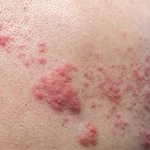(Reuters Health)—Adults 50 years and older who take tumor necrosis factor inhibitors (TNFi’s) for a range of inflammatory disorders can receive effective protection from shingles with a live varicella zoster vaccine, a clinical trial suggests.1 Researchers randomized 617 participants receiving TNFi’s in a 1:1 ratio to receive either the Zostavax live varicella zoster vaccine or…
Search results for: zoster
Live Herpes Zoster Vaccine Fails to Provide Long-Term Protection in RA Patients on Tofacitinib
(Reuters Health)—The live herpes zoster vaccine does not provide reliable long-term protection in rheumatoid arthritis (RA) patients taking tofacitinib, a recent study suggests. Current ACR guidelines conditionally recommend that patients with RA who are 50 years and older be vaccinated against herpes zoster prior to starting therapy with the Janus kinase (JAK) inhibitor tofacitinib or…

Varicella Zoster Virus Not Associated with Giant Cell Arteritis Pathogenesis
Researchers suggest antiviral therapy is not appropriate for patients with GCA, based on their study findings and related research…

Zoster Reactivation Risk in Patients Treated with Cyclophosphamide
Varicella-zoster-virus (VZV) reactivation, which can cause patients to develop herpes zoster (i.e., shingles), occurs more frequently in patients with systemic vasculitis and systemic lupus erythematosus (SLE) who have received intravenous cyclophosphamide than in otherwise healthy adults, according to a retrospective study published in The Journal of Rheumatology by researchers in France.1 The study also shows…
Herpes Zoster & Tofacitinib
Shingles, also known as herpes zoster (HZ), is a common and sometimes debilitating disease that disproportionately affects elderly individuals and those who are immunocompromised. Patients with rheumatoid arthritis (RA) have a 1.5–2-fold higher risk of developing HZ compared with healthy adults. Treatment with some disease-modifying anti-rheumatic drugs (DMARDs) has been shown to increase this risk….
Herpes Zoster & the Risk of Stroke in Patients with Autoimmune Diseases
Herpes zoster (HZ) infection, also known as shingles, is caused by reactivation of latent varicella-zoster virus infection generally acquired decades earlier. This study was designed to test the hypothesis that the incidence of stroke immediately following HZ infection is increased in patients with autoimmune diseases compared with the incidence of stroke at later time points. Results: In patients with autoimmune diseases, incident HZ was associated with as much as a twofold increased risk of stroke. Prompt antiviral therapy was associated with lower incidence of subsequent stroke…

Varicella Zoster Virus Downregulates Programmed Death & Promotes Inflammation
A recent study found that the varicella zoster virus downregulates expression of programmed death ligand 1 and major histocompatibility complex 1 in brain fibroblasts, perineurial cells and lung fibroblasts. These effects may lead to persistent inflammation in the vessels and lungs, as well as promote subsequent infection of T cells and the spread of the virus…

2015 ACR/ARHP Annual Meeting: Stroke Risk Elevated after Herpes Zoster Infection Among Patients with Autoimmune Disease
SAN FRANCISCO—The risk of stroke after herpes zoster (HZ) infection is elevated in the period immediately after infection in patients with autoimmune diseases, according to a study presented at the 2015 ACR/ARHP Annual Meeting.1 The findings were presented in a scientific session, called Discover 2015, that highlighted new research. In another study from the session,…

Varicella Zoster Virus May Cause Giant Cell Arteritis
Researchers have recently discovered a connection between the varicella zoster virus infection, which causes chicken pox and shingles, and giant cell arteritis…

15,000 Patient-Years: Safety Data for Upadacitinib Treatment Across Multiple Rheumatic Conditions
Burmester et al. characterized the long-term safety profile of upadacitinib treatment across multiple rheumatic diseases.
- 1
- 2
- 3
- …
- 12
- Next Page »